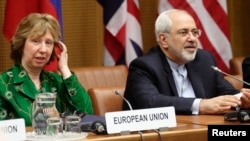BRUSSELS —
Iran has said it should be able to produce fuel for its Bushehr nuclear power plant, a demand that world powers are unlikely to agree to and that may jeopardize a July deadline for a deal to end its nuclear standoff with the West.
Diplomats from the six major powers negotiating with Tehran said Iranian negotiators expressed the demand at the latest talks in May, identifying one reason why little progress was made toward a nuclear deal that could end Tehran's economic isolation.
Iran's ability to produce enriched uranium goes to the heart of a decade-old dispute over its nuclear program. The fuel can be used both to power reactors and, if further processed, to make the core of a nuclear warhead.
A diplomat from the “P5+1” countries in talks with Iran -- the United States, Russia, China, France, Britain and Germany -- told Reuters the Iranians “expect to get capacity to fuel Busheh and that’s unrealistic.
“It gets you a very short breakout time,'' he said, referring to the time necessary to produce enough highly enriched uranium for one bomb.
Current U.N. Security Council resolutions demand that Iran suspend all uranium enrichment. The country has refused, saying its nuclear work is entirely peaceful. A new deal likely would allow enrichment, but it also would aim to extend significantly the amount of time Iran would need to assemble bomb material if it chose to do so.
Talks are scheduled to resume in mid-June.
Russian opposition?
Iran's demand to make its own fuel for the 1,000-megawatt power plant in the southern port city of Bushehr may face resistance from Russia, which built it and in 2011 signed a 10-year contract to supply the fuel.
That might hurt Tehran’s negotiating stance, which relies in part on Moscow's moderate approach toward Tehran compared to the West at the talks.
To reach a deal, the sides will also have to agree on issues such as the future of other Iranian nuclear facilities and the speed and timeline of Western relief from economic sanctions.
One diplomat said Iran seemed to have scaled back its previous openness to resolve concerns over the heavy-water Arak reactor, which the West fears could provide plutonium for bombs once it is operational.
Centrifuge number a core concern
At the May talks, Iranian officials appeared to suggest specific technical solutions that ran contrary to Western expectations, diplomats said. Iran has since publicly dismissed as “ridiculous” one solution that could allay western concerns.
A key issue that will determine Iran's enrichment capacity is the number of centrifuges, the machines spinning at supersonic speed to concentrate uranium's fissile element, which it can retain.
Iran now has about 19,000 centrifuges, with roughly half of them in operation. Western diplomats say only about half of the number of machines operating would be acceptable, although any long-term deal would depend on other factors, including the extent of oversight by the U.N. nuclear watchdog.
Such a number could be a small fraction of what might be needed to fuel Bushehr.
Diplomats from the six major powers negotiating with Tehran said Iranian negotiators expressed the demand at the latest talks in May, identifying one reason why little progress was made toward a nuclear deal that could end Tehran's economic isolation.
Iran's ability to produce enriched uranium goes to the heart of a decade-old dispute over its nuclear program. The fuel can be used both to power reactors and, if further processed, to make the core of a nuclear warhead.
A diplomat from the “P5+1” countries in talks with Iran -- the United States, Russia, China, France, Britain and Germany -- told Reuters the Iranians “expect to get capacity to fuel Busheh and that’s unrealistic.
“It gets you a very short breakout time,'' he said, referring to the time necessary to produce enough highly enriched uranium for one bomb.
Current U.N. Security Council resolutions demand that Iran suspend all uranium enrichment. The country has refused, saying its nuclear work is entirely peaceful. A new deal likely would allow enrichment, but it also would aim to extend significantly the amount of time Iran would need to assemble bomb material if it chose to do so.
Talks are scheduled to resume in mid-June.
Russian opposition?
Iran's demand to make its own fuel for the 1,000-megawatt power plant in the southern port city of Bushehr may face resistance from Russia, which built it and in 2011 signed a 10-year contract to supply the fuel.
That might hurt Tehran’s negotiating stance, which relies in part on Moscow's moderate approach toward Tehran compared to the West at the talks.
To reach a deal, the sides will also have to agree on issues such as the future of other Iranian nuclear facilities and the speed and timeline of Western relief from economic sanctions.
One diplomat said Iran seemed to have scaled back its previous openness to resolve concerns over the heavy-water Arak reactor, which the West fears could provide plutonium for bombs once it is operational.
Centrifuge number a core concern
At the May talks, Iranian officials appeared to suggest specific technical solutions that ran contrary to Western expectations, diplomats said. Iran has since publicly dismissed as “ridiculous” one solution that could allay western concerns.
A key issue that will determine Iran's enrichment capacity is the number of centrifuges, the machines spinning at supersonic speed to concentrate uranium's fissile element, which it can retain.
Iran now has about 19,000 centrifuges, with roughly half of them in operation. Western diplomats say only about half of the number of machines operating would be acceptable, although any long-term deal would depend on other factors, including the extent of oversight by the U.N. nuclear watchdog.
Such a number could be a small fraction of what might be needed to fuel Bushehr.












